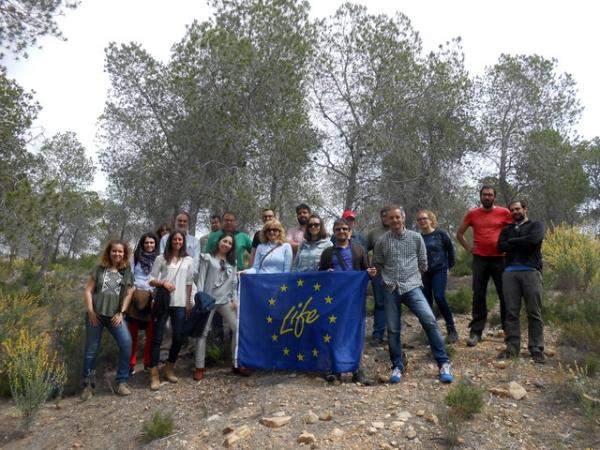The effects of climate change entail an imbalance in the carbon cycle. To prevent this, strategies are being sought to reduce the excess of CO2 emissions in the atmosphere. To meet the criteria set down in the Kyoto Protocol, Spain needs to sequester more carbon. Until now large sums of money have been paid every year for the excess emissions being released into the atmosphere, and this is something that scientists are seeking a solution for.
The Life Forest CO2 project, featuring work by the "Evaluation and restoration of agricultural and forestry systems" research group at the University of Córdoba, led by Professor Rafael Mª Navarro Cerrillo, has developed administrative mechanisms to optimize the carbon sequestration capacity of forests. Despite the widespread belief that the best way to capture CO2 from the atmosphere is by simply planting trees, it has been shown that forestry -the science of managing forests - works better and better bolsters sequestration capacity.
Although much debate continues, the real problem is that there are no mechanisms to use forestry as a compensation strategy. Hence, the Life Forest CO2 project, on which the UCO is participating together with 6 other partners, is striving to provide a solution in this regard.
The original idea of the study is based on the need to uphold forestry as a tool to sequester carbon. More specifically, it focuses on forestry applied to reforestation in Mediterranean areas, since it has been shown that "the greater carbon reservoir is soil, rather than vegetation", explained project researchers Rafael Mª Navarro and Guillermo Palacios Rodríguez.
Important progress has already been made; although the Kyoto Protocol did not recognize forestry as a CO2 offset mechanism, the Paris Agreement does. This establishes a new way for governments to create tools that promote the carbon market at the national and regional levels.
"Spain should be sequestering several million tons of CO2 a year, and everything that we emit above the established limits has to be paid for," explained Professor Navarro. Therefore, the use of forestry as a carbon sequestration strategy would mean major savings for the country, and would considerably improve the state of our forests. And this, together with other good practices, such as those that can be carried out in agriculture, would help offset emissions.
What is clear is that unity is strength. Therefore, Professor Navarro believes that "if the forestry sector implemented a compensation mechanism through forest management, many millions of tons would be sequestered" . This would be positive economically and environmentally, generate many jobs in the primary sector, enrich the rural world, and benefit Spain's depopulated rural areas.
The project ended in June of this year and, until then, its researchers had held meetings with those responsible for climate change at various institutions at the regional and national levels. "We had a meeting with those responsible for climate change at the Ministry where they expressed their desire for these mechanisms to be included in the future Climate Change Law," explained Navarro. This law aims to establish a protocol according to which Spain's Autonomous Communities can manage forest systems based on carbon capacity.
At the Andalusian level, there is already the SACE (Andalusian Emissions Compensation System), through which companies voluntarily help to fight climate change. But this system still needs to be rendered operational. In another of the communities where the project is also being implemented, Murcia, compensation mechanisms have already been put in place. Thus, they hope that they will also be applied in Andalusia soon.
The Life Forest CO2 Project - “Assessment of forest-carbon sinks and promotion of compensation systems as tools for climate change mitigation” (LIFE14 CCM/ES/001271) is funded by the European Union through the LIFE 2014 call.
"This report is part of the project “CONSOLIDA-UCO ECT2020-000810", funded by MCIN/AEI/10.13039/501100011033 and by European Union “NextGenerationEU”/PRTR”.


